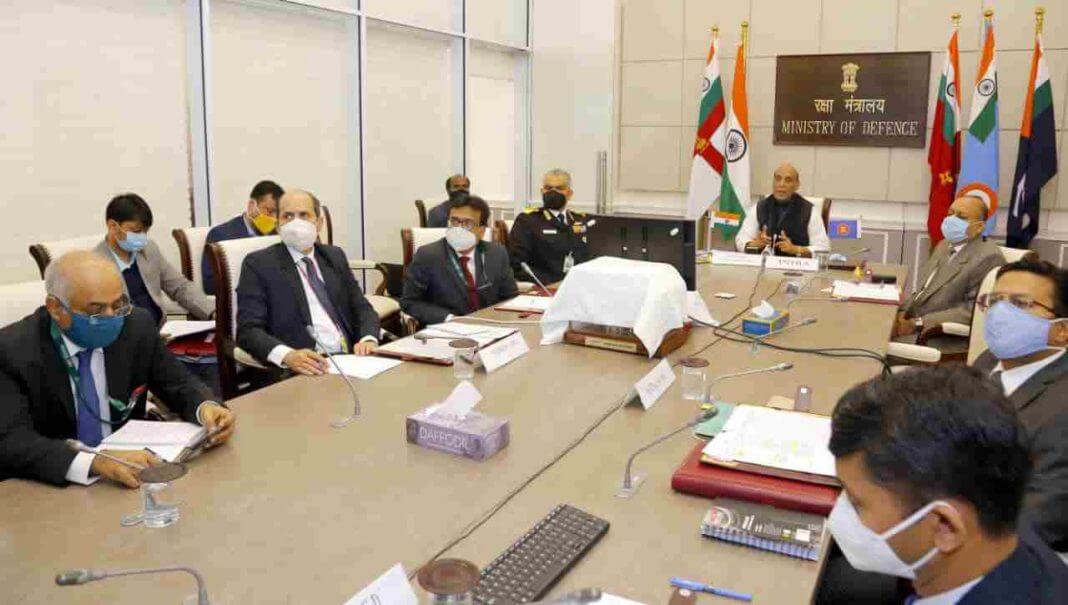Rajnath Singh Addresses ASEAN Defence Ministers’ Meeting
On Thursday, Indian Defence Minister Rajnath Singh attended the Association of Southeast Asian Nations (ASEAN) Defence Ministers’ Meeting (ADMM+). Apart from the ten members of the ASEAN, the ADMM+ includes eight of the group’s dialogue partners, namely Australia, China, India, Japan, New Zealand, South Korea, Russia and the United States. It was formed in 2010 with the aim to bolster cooperation in defence and security.
Addressing fellow defence ministers, Singh spoke of a barrage of issues that are currently burdening the region, including maritime security, cybercrimes and terrorism. In a veiled attack on China, he called upon leaders to focus on “exercising self-restraint,” to achieve peace in the region. He said: “our ability, to collectively respond to challenges in the region based on the fundamentals of freedom, inclusivity and openness will define our future.”
Singh also urged other defence ministers to work towards a more cooperative and collaborative approach to the COVID-19 pandemic. In light of the global economic recession, he called for a joint effort to steer the members of the forum towards “the path of recovery.”
Further, he applauded the ASEAN and the ADMM+ forum for promoting multilateral cooperation focussing on a “pluralistic, cooperative security order in Asia.” Celebrating the tenth anniversary of the ADMM+, he called the platform a “fulcrum of peace, stability and rules-based order” in the Indo-Pacific region.
India Building On ‘Extended’ Neighbourhood First Policy
On the same day, Riva Ganguly, India’s Secretary (East) for the Ministry of External Affairs, met with the Second Permanent Secretary of Singapore, Stanley Loh, for a bilateral discussion on bolstering their economic and security partnership. The two further discussed strengthening the ASEAN-India partnership. India and Singapore have also recently conducted the 27th edition of SIMBEX-20, which is a bilateral naval exercise conducted by India and Singapore.
Last month, in what was considered a significant victory for China’s ambition to extend its economic influence across the globe, fifteen countries from the Indo-Pacific region, including Singapore and Thailand, signed the Regional Comprehensive Economic Partnership (RCEP) trade deal. Meanwhile, India decided to opt-out of the deal citing the poor quality of Chinese imports as a reason for its decision. Apart from several East Asian countries, two of India’s allies from the Quad—Australia and Japan—also signed this trade pact. This was seen as a significant setback for India’s ambitions to work with its regional allies to counter Chinese aggression in the Indo-Pacific.
Thursday’s dialogues come as India looks to expand its influence in its extended neighbourhood as a part of its “Neighbourhood First Policy.” In furtherance of this aim, over the past few weeks, India has held talks with Vietnam and Seychelles. Apart from its neighbours in the East, India is also focussing on its Arab allies. Consequently, on Friday, the India’s Ministry of External Affairs is organising a panel discussion on the Gulf Cooperation Council-India partnership. According to an official statement by the Ministry, the debate will address issues such as “energy partnerships, investment opportunities and emerging technologies.” These will be further discussed in the Pravasi Bharatiya Divas (PBD) convention scheduled in January 2021.
Chief Of Army Staff General Naravane Begins Tour Of West Asia
Moreover, on Tuesday, Indian Chief of Army Staff General Naravane announced the start of his “historic” six-day visit to the United Arab Emirates (UAE) and Saudi Arabia. According to a statement by the Indian army, the aim of the trip is to strengthen India’s “strategic and defence cooperation” with the two countries.
Over the past few decades, both the UAE and Saudi Arabia who were originally close partners of Pakistan, have been working towards improving their relations with India. This also comes as Pakistan’s friendship with several powers in the Middle East continues to deteriorate. Recently, the United Arab Emirates suspended visit visas of Pakistani citizens, citing security concerns. On the other hand, earlier this year, relations between Riyadh and Islamabad took a turn for the worse when the Kingdom denied the South Asian country’s appeal to convene an OIC Council of Foreign Ministers meet to discuss the Kashmir issue. Consequently, Pakistani Foreign Minister Shah Mahmood Qureshi, said, “If you cannot convene it, then I’ll be compelled to ask Prime Minister Imran Khan to call a meeting of the Islamic countries that are ready to stand with us on the issue of Kashmir and support the oppressed Kashmiris.
Qureshi’s statement was the spark that ignited tensions between Pakistan and Saudi Arabia. In November 2018, during Saudi Crown Prince Mohammed bin Salman’s diplomatic visit to Islamabad, the two countries had signed a $6.2 billion package that included $3 billion in fiscal loans and $3.2 billion in oil credit facilities. In retaliation to Qureshi’s statement, Saudi Arabia halted its oil supply and ended a financial loan deal with Pakistan. These developments also raise doubts about the future of 2019 MoUs signed between the two Islamic countries, which included Saudi investments in Pakistan valued at around $20 billion, including the setting up of an oil refinery in the port city of Gwadar, a strategic area at the crossroads of the Gulf of Oman and a crucial element of the China-Pakistan Economic Corridor (CPEC) project.
Furthermore, in pursuance of India’s bid to strengthen its partnership with its West Asia allies, on December 8, Prime Minister Narendra Modi held a phone call with Qatari Emir Sheikh Tamim Bin Hamad Al-Thani. The two discussed the creation of a special task force to facilitate investment by the Qatar Investment Authority (QIA) into India. The two leaders also pledged to boost bilateral cooperation, explored the potential for Qatari investments in the energy sector in India, and reviewed the progress made in these areas.
India Turns to Southeast Asia and Gulf to Strengthen Ties With “Extended Neighbourhood”
India attended the ASEAN Defence Ministers’ Plus meeting in search of stronger defence and security partnerships. Meanwhile, the Indian army chief began his tour to the UAE and Saudi Arabia.
December 11, 2020

SOURCE: GLOBAL TRIBUNE
